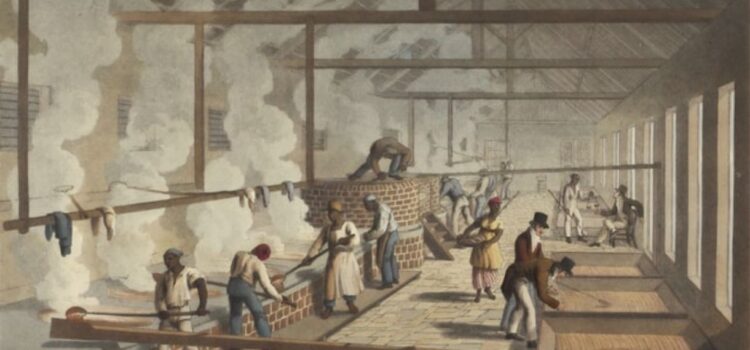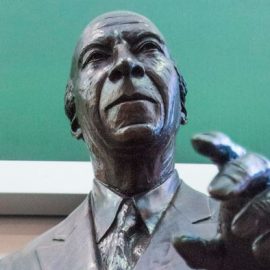

This article is an excerpt from the Shortform book guide to "The 1619 Project" by Nikole Hannah-Jones. Shortform has the world's best summaries and analyses of books you should be reading.
Like this article? Sign up for a free trial here .
What was the Revolutionary War, and why did it happen? What role did slavery play in the American Revolution?
According to American investigative journalist Nikole Hannah-Jones, the main driver of the American Revolution was not the righteous intentions of the abolitionists in the North. In her book The 1619 Project, she argues that (1) the Revolutionary War was not truly fought in the name of freedom and justice; (2) the North wasn’t as righteous as it’s given credit for; and (3) Black Americans were the ones to truly create and establish American democracy.
Keep reading to learn about the role of slavery in the American Revolution.
Abolitionists in the North Led the American Revolution and Crafted American Democracy
According to Nikole Hannah-Jones, the American Revolution was largely an effort to prevent Britain from abolishing American slavery and was sparked by wealthy enslavers in the North and South (like George Washington). The colonists feared that Britain would immediately impose their abolitionist ideals on them. This concerned white enslavers because it would bring economic losses and violent retribution from their former slaves. This also concerned poor whites because although they were low on the social hierarchy, their whiteness gave them a sense of superiority which they would lose if slavery were abolished.
| The Role of Slavery in the American Revolution Hannah-Jones’s claim that colonists broke from Great Britain in part to protect the institution of slavery is one of the most widely disputed claims made in The 1619 Project. Even one of the official fact-checkers of the project denounced it, adding that she (the fact-checker) informed the New York Times of the inaccuracy but that they ignored her advice and included the statement anyway. The fact-checker elaborates that although slavery in Britain was abolished in 1772, this posed no threat to the colonies and would therefore not have been a factor in the American Revolution. Not only did Britain wait an additional 60 years to abolish slavery in their remaining colonies, but the decision was made to cut costs, not to impose the motherland’s rules. So the fact-checker explains that contrary to Hannah-Jones’s claim, it wouldn’t make sense for the colonists to fear the British immediately abolishing American slavery. |
Second, Hannah-Jones argues that the myth of America breaking from Britain to provide “freedom and justice for all” is hypocritical. This creed, which was emphasized throughout America’s founding documents, didn’t really mean all. Black Americans were viewed as property and therefore not entitled to human rights like freedom or justice.
Third, the myth of the “free abolitionist North” leading the fight for American freedom is historically inaccurate—Hannah-Jones says that the North was neither free (they also owned slaves and participated in the slave trade) nor abolitionist at this time. Further, the authors of America’s founding documents (like the Declaration of Independence and the Constitution) were all slave owners and mostly Virginian Southerners like Thomas Jefferson and James Madison.
However, despite being excluded from America’s founding documents, Black Americans have been the ones to most fervently uphold and represent the tenets and ideals of democracy. Hannah-Jones argues that Black Americans repeatedly fought for their freedom until abolition in 1863 and were ardently involved in perfecting democracy afterward—through movements like Civil Rights and Black Lives Matter, they’ve pushed for legislation that provides equal rights, representation, opportunities, and treatment not only for themselves but for other minorities as well.
(Shortform note: To Hannah-Jones’s point, experts explain that the American founding story was specifically crafted by a Harvard historian named George Bancroft in an attempt to provide a sense of nationhood to American citizens. This was necessary because, initially, Americans were only linked by a single shared experience—the American Revolution—rather than a shared culture or ethnicity. But as time distanced them from that historical event and secession movements began spreading, Americans needed something else to hold them together. So Bancroft created America’s founding mythology: a civic nation founded under God that was created to protect equality, liberty, self-government, and the natural rights of all people.)

———End of Preview———
Like what you just read? Read the rest of the world's best book summary and analysis of Nikole Hannah-Jones's "The 1619 Project" at Shortform .
Here's what you'll find in our full The 1619 Project summary :
- A reframing of American history with the institution of slavery at its core
- How democracy as we know it today was largely built by enslaved Blacks
- The racist institutions that persist today that originated from slavery






